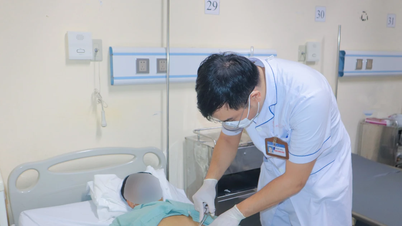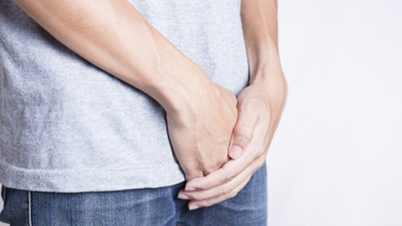Benign prostatic hyperplasia, also known as benign prostatic hyperplasia, benign prostatic hyperplasia or benign prostatic hyperplasia... is a common disease in older men.
This article was professionally consulted by Dr. Tra Anh Duy, Men's Health Center.
Reason
Currently, the exact cause of prostate enlargement is unknown.
Morbidity rate
- The incidence of the disease increases with age.
- Rare before age 40, about 50% of men aged 50-60 and 90% of men aged 80-90 have this disease.
Symptom
Symptoms occur when the urethra is blocked and the bladder cannot empty all the urine. Therefore, problems may occur:
- Irritation symptoms:
* Dribbling day and night.
* Urgency
* Frequent urination, especially at night.
- Symptoms of obstruction:
* Weak urine stream.
* Intermittent urination.
* Urinate with straining.
* Feeling of incomplete urination.
* Dribbling urine, which may cause urinary retention.
Diagnose
- Diagnosis is based on the patient's ability to self-report symptoms using a symptom score and quality of life questionnaire.
- Doctors evaluate the prostate in the following ways:
* Digital rectal examination to assess prostate characteristics.
* PSA (Prostate-Specific Antigen) quantitative test: This index is often high in cases of prostate cancer and prostatitis.
* Abdominal ultrasound evaluates the prostate and entire urinary system.
* Rectal ultrasound and prostate biopsy when prostate cancer is suspected.
* Uroflowmetry evaluates urine flow and cystoscopy may be performed if necessary.
Treatment
Depending on the severity of the disease, the doctor will have a suitable treatment plan for each patient. Treatment mainly depends on the level of urinary disorder of the patient, not much on the size of the prostate.
- Monitor:
* Patients with mild urinary disorders that do not significantly affect their quality of life only need regular monitoring.
* Lifestyle changes that can help improve symptoms include reducing/stopping alcohol and coffee; exercising regularly; urinating as soon as you feel the urge; drinking small amounts of water several times a day; avoiding drinking large amounts of water before bed; and avoiding stress.
- Use of drugs:
Currently, many combination drugs such as bladder neck muscle relaxants, prostate size reducers... help slow disease progression and improve the patient's quality of life.
- Surgery:
In case of severe urinary disorders or complications, surgical treatment is necessary:
* Endoscopic prostatectomy using monopolar, bipolar, laser, prostatic shunting...
* Open surgery.
America and Italy
Source link




































![[Photo] Solemn opening of the 12th Military Party Congress for the 2025-2030 term](https://vphoto.vietnam.vn/thumb/1200x675/vietnam/resource/IMAGE/2025/9/30/2cd383b3130d41a1a4b5ace0d5eb989d)
![[Photo] The 1st Congress of Phu Tho Provincial Party Committee, term 2025-2030](https://vphoto.vietnam.vn/thumb/1200x675/vietnam/resource/IMAGE/2025/9/30/1507da06216649bba8a1ce6251816820)
![[Photo] President Luong Cuong receives President of the Cuban National Assembly Esteban Lazo Hernandez](https://vphoto.vietnam.vn/thumb/1200x675/vietnam/resource/IMAGE/2025/9/30/4d38932911c24f6ea1936252bd5427fa)
![[Photo] Panorama of the cable-stayed bridge, the final bottleneck of the Ben Luc-Long Thanh expressway](https://vphoto.vietnam.vn/thumb/1200x675/vietnam/resource/IMAGE/2025/9/30/391fdf21025541d6b2f092e49a17243f)


































































Comment (0)